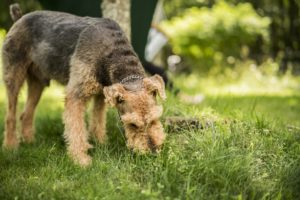Why Does My Dog Eat Grass?
Have you ever seen your dog eating grass? Do you ever stop to wonder why they might be doing this? Is there something to worry about when you notice this behavior?
Grass eating is a very common practice among dogs, and for the most part, there isn’t anything to worry about when your dog does it. However, there are several potential reasons for this behavior, and it’s important to try to figure out which one might be affecting your dog. Read through the article below to see which potential cause sounds the most like your pet’s situation. If you have any questions, call Bottletree Animal Hospital in Oxford, MS at (662) 234-4336.

Digestive Help
Some pet behavior specialists believe dogs eat grass to help with their digestion. Although this concept is sometimes disputed, it seems likely. Many dogs tend to eat grass as a way to regulate their digestive system and help keep themselves feeling great.
Of course, this is not always the case. Some dogs with digestive problems may never try to eat grass, while other dogs who eat grass often may not see any benefits from it. Still, this cause is the most common one, and it is the most likely in the majority of dogs.
Fiber Intake
If your dog is on a poor quality diet, they may be trying to increase their fiber intake by eating grass. Their body may be giving them the instinctive urge to eat more fiber, and they may be supplementing what they eat with a little nibble of grass now and then.
If you think this could be the cause of your dog’s grass eating habit, try feeding them a higher-quality diet with more fiber. This may make the habit stop altogether, and if so, you can feel certain you determined the cause of the issue.
Nervous Behavior
Some dogs may be so anxious that they start chewing on grass out of nerves. If your dog is a nervous chewer, grass may be a reasonable option for them, especially when they’re left out in the yard unattended. Dogs may chew on grass when they’re anxious about being left alone, when they see other dogs nearby, or when they hear fireworks or thunder, for example.
If your dog has severe anxiety, you may need to speak with your vet about putting them on a dog-safe anti-anxiety medication. However, many dogs can recover from their anxiety with the help of training and extra playtime with the family.
Boredom
Similarly to nervous chewing, some dogs are bored chewers. Your dog may simply not have anything else to do while they’re out in the yard, so they might turn to the grass to keep themself occupied. This is another very common cause of grass eating in dogs.
You can cut down on this behavior in a bored dog by providing them with more to do when they’re outside. Keep plenty of fun toys outdoors and consider adding a puzzle toy or game for them to work on solving while they’re outside, too.
Exploring
Some dogs, especially younger dogs and puppies, may eat grass because they’re still exploring their surroundings. If you notice your dog eating grass and know that they’re still getting used to their environment because they’re very young, you can assume they’re just exploring. They might develop a taste for grass throughout their life, or they might give up on eating it when they get a little bit older.
Make sure you don’t let unvaccinated puppies eat grass, however. Grass and dirt can contain a variety of puppy illnesses that are very dangerous and potentially deadly before puppies have had all of their shots.
Liking the Taste
Last but not least, some dogs may just like the taste of grass! This is completely normal, and some pet behavior specialists believe it is actually the most common cause of dogs eating grass. They might enjoy the feeling of the grass as they chew on it, too, which can contribute to grass eating for “no reason.”
If you have a grass eater, don’t worry; none of the potential causes of this behavior are serious ones, and chances are that they just like to eat grass. As long as you know the grass is safe and free from chemical treatments, let them go for it!
As you can see, most of the causes of dogs eating grass are not serious ones, and it’s okay to let your dog continue to do this under most circumstances. However, make sure your dog is not eating grass anywhere other than in your own lawn where you know it’s safe. Additionally, do not let them eat grass for several days after it has been treated for pests. There’s usually no reason to take your dog to the vet for eating grass. However, if you’re concerned, you can always bring up the topic with your vet during your dog’s next regularly scheduled appointment. Call us today at (662) 234-4336.
Recent Posts
About Us
Welcome to Bottletree Animal Hospital, your family-friendly veterinarian in Oxford. We are a team of animal lovers who are passionate about veterinary excellence. We love working closely with you and your pet to help us learn more about your furry friend, their lifestyle, and their needs.

